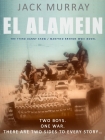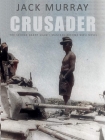El Alamein, Jack Murray [best autobiographies to read .txt] 📗

- Author: Jack Murray
Book online «El Alamein, Jack Murray [best autobiographies to read .txt] 📗». Author Jack Murray
They drove for a few kilometres. A dust cloud in the distance prompted Manfred to check his telescope. Moments later Basler confirmed what Manfred could see. Tanks in the distance. Not the new tank with the powerful gun but the less dangerous Stuart tank and some Crusaders.
‘Distance is just under nine zero, zero metres,’ said Manfred.
‘Fire when you’re ready,’ ordered Basler.
‘Gerd, HE shells,’ said Manfred to his loader. Kleff’s sweat-soaked face made the barest hint of a nod. Manfred fired. And missed.
‘Three metres, short. They’ll be aware of us now,’ said Basler, unworried. Manfred was angry with himself. He hated showing any sign of weakness or incompetence in front of the lieutenant. Kleff loaded another shell and Manfred made sure of his aim. He pressed the trigger. Nothing. He pressed again.
‘Fire, Brehme,’ pressed Basler, clearly irritated.
‘It’s not working,’ replied Manfred. He looked at Kleff. ‘Reload, Gerd.’ Kleff removed the shell and threw it back in.
‘Ready?’ asked Manfred. Kleff nodded.
This time the Manfred’s aim was unerringly accurate. The tank erupted into flames. The hatches kicked open and a couple of tank crew emerged from the flames. Moments later a machine gun began chattering. It was Gunter Keil, the radio operator.
Basler shouted down.
‘Cease firing.’
Keil looked up at Basler in confusion. Even Manfred was a little surprised. He, personally, did not believe in firing at enemy escaping from a burning tank. He hadn’t expected Basler to be of a similar view. The more time he spent with the former SS lieutenant the more highly he regarded him. Manfred was also beginning to understand why he had not risen further despite his evident abilities.
‘Sir?’ asked Keil.
Basler glared at Keil. The radio operator released his finger from the trigger. No more was said. The other Panzer tanks had opened fire on the British tanks to devasting effect. Explosion followed explosion. The British tanks fired back but their shots fell harmlessly short. Then Basler snapped at Manfred.
‘Why have you stopped firing at the tanks?’
Manfred motioned to Kleff who opened the breech and loaded another shell. Manfred pressed the firing button. There was no response.
‘What is going on down there?’ yelled Basler.
Kleff opened the breech and shut it again more firmly. A split second later Manfred fired and hit a second tank.
The British began to withdraw quickly. Manfred fired half a dozen other shells, but the remaining enemy tanks were moving too quickly and avoided any serious damage. Basler ordered a halt to the firing. The guns fell silent. The German tanks moved forward slowly. They reached the burning British tanks a few minutes later. Nine of them lay in flames following the short engagement. Basler glanced down into the hull and pointed to Kleff and Keil.
‘Go and see what we can use from the British tanks. Don’t rob the soldiers,’ ordered Basler. He seemed to be staring at Keil when he said this.
Kleff and Keil exited the hatch and went in search of anything they could salvage. A few of the other tank crews were similarly engaged. This made Manfred smile. Once upon a time that had been his job. He still had nightmares of the sights he’d seen inside the destroyed tanks. The charcoal figures that had once been men. The charcoal smell of these tanks was something he knew he would never forget.
Moments later he heard Basler make a dismissive noise. Manfred shot Basler a glance. The lieutenant smiled grimly.
‘See for yourself.’
Manfred climbed up through the cupola. He caught sight of Keil bent double retching by the side of one tank. Perhaps it was the state of the dead in the tanks or, Manfred hoped, it was seeing the dead bodies of the Englishmen he’d gunned down as they escaped from their burning tank. Manfred had heard many stories from the other crews of how the British had not shot at German soldiers as they escaped. Many on both sides had adopted this practice. Of course, it was not always the case. Some, like Keil, continued the killing. It seemed cowardly to Manfred. The look on Basler’s face suggested that he’d deliberately wanted Keil to view the result of his own murderous proficiency.
Perhaps Keil would learn from what he’d done. If he did, though, it would come at a cost. The heart might confess but the mind would not forget. Manfred was grateful to Basler that he’d not asked him to go. The thought of seeing what his own accuracy had caused would have killed something inside of him. It might have made him hesitate when required to push the firing button. This would endanger them all. Manfred realised that the shield he had against his own feelings of guilt was the knowledge that he had not solely been following orders. Quite simply, it was self-defence. They were firing at him.
-
The halt lasted over an hour and then they were off again until darkness and low fuel forced them to stop. There was no further contact with the enemy. With some relief, they formed a leaguer between Rigel Ridge and Bir Lefa around ten kilometres south of Acroma. They had now lost contact with the rest of the division and would need to refuel if they were to continue the chase.
The evening revealed the toll extracted by the day’s fighting. The regiment was down to thirty-nine tanks that could still run. Twenty-three had been destroyed beyond salvage and the others, including Gerhardt’s, had broken down or been damaged in the firefight and required repair.
‘What happened to you?’ asked Manfred when he finally found his friend in the leaguer.
‘The engine





Comments (0)